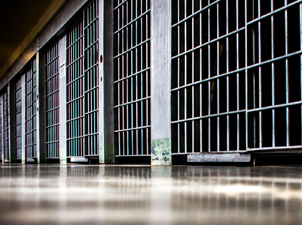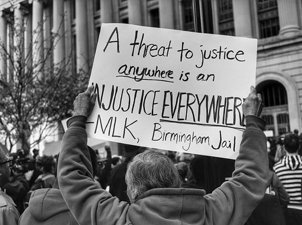
The Crucifixion Keeps Happening, Over and Over Again
Simone Campbell, SSS
March 14, 2016
The story of Jesus’ passion and death has stirred my imagination since I was a child. In an act of profound mystery, Jesus walks towards the conflict swirling around him. Jesus accepts his arrest and does not raise his voice. His willingness to embrace the consequences of truth-telling leaves him silent in the face of his accusers. His judges repeatedly say they can find no fault in this man, but the people want more. They want someone to blame.
It makes me think of the fear and anger roiling in our nation and capitalized on by some of our presidential candidates. Whom can we blame? Whom can I direct my anger toward? Many holler to deport those who are different. Many demand that the stranger at a rally be expelled. Many people with white skin fear those who have a darker pigment. And those with a darker pigment fear what will happen to them when white fear runs rampant. Fear and hate cause people to demand that those who are different be crucified so that those who are yelling will feel less uncomfortable in our complex society.
But this is the deeper truth: Hate and fear have no place in the Gospel. Jesus welcomes everyone, including Pilate, Herod, Simon of Cyrene, and the women of Jerusalem. He stands in the midst of conflict with reflection and respect. Facing groundless charges, he doesn’t retaliate. He either answers simply or stays silent and lets the scenes play out trusting in the presence of a deeper truth. We are challenged, as a nation, to journey into this deeper truth. This deeper truth is the embodiment of love beyond understanding.
In September 2015, while on our Nuns on the Bus tour in advance of Pope Francis’ visit to the United States, I met women whom I think of as Jesus in the story of the passion. They are in the grip of suffering for their children, yet they do not cry out or retaliate. I met Amy, an African-American mom in St. Louis who worries every day about the safety of her two sons, one in tenth grade and the other in eighth grade. She quizzes them regularly about what to do when stopped by the police. She tells them that they need to keep their hands out of their pockets and their arms away from their body. They need to say “yes sir,” “no sir,” and don’t demonstrate any teenage attitude. She showers her boys with worry and advice so that they might be safe.
Her eighth grader asked her, “Mommy, how long is this going to go on?”
Amy, in her love, told him the current truth. She said, “The rest of your life.”
This is the worry of moms in a society where young African-American teens can be seen too quickly as a threat. It is her worry which is quite like the worry of the women of Jerusalem. On his way to Calvary, Jesus says to them, “Do not weep for me. Weep for yourselves and your children.”
“The question for me is: Was I there when they crucified my Lord?” —@sr_simone
Jesus in his love knows that it is not about him, but the struggles of our families and our destructive tendencies. It is the toxicity of racism that is crucifying our young men in the streets of our cities. We need to weep so that we may act differently.
Also on the bus trip, in Missouri we met the two mothers who started Just Moms STL. They live near the superfund clean-up site known as West Lake Landfill. This buried toxic heap was created by the waste from the creation of the atomic bomb in World War II. This nuclear waste was buried, but has been emitting radiation for over 70 years. Now these mothers have come together because their children have been diagnosed with brain cancer. They discovered that there is a 300 percent increase in the level of childhood brain cancer for those living near this site. Not only that, but we were told that the waste itself has caught fire underground and is gradually smoldering its way towards the Missouri River. And yet, no one is cleaning up the mess. Rather, the corporations are arguing about who should pay for it. They are doing this while children suffer and our land cries out to be rid of the toxicity of human making.
This is the road to Calvary. How do we become Simons of Cyrene to help with these crosses? Are we willing to let our hearts be broken open by the anguish and struggle of our time so that we might find some form of conversion and change?
Jesus walked step by step toward those who condemned him. He revealed the truth either in accepting the title he was given (King of the Jews), or his concern for the women of Jerusalem. In the midst of his anguish, he felt another’s pain. This is the gift of love that is not preoccupied with itself, but rather sees the needs of others. Dare we love enough to move beyond our nation’s endemic racism and embrace Amy and her sons so that their story might have a different ending? Do we love enough to move toward helping the moms trying to save their children from the toxicity that is consuming our planet?
Some presidential candidates breed fear and hate, becoming like the mob in Jesus’ time demanding someone’s life. They nourish the toxicity rife in our society. We as Christians are challenged by Jesus to live differently. We are challenged to stand up for Amy and her sons and the mothers at the West Lake Landfill. Do I act to change the future of our nation or do I too call for blood? The question for me is: Was I there when they crucified my Lord?
This article originally appeared at On Scripture.












